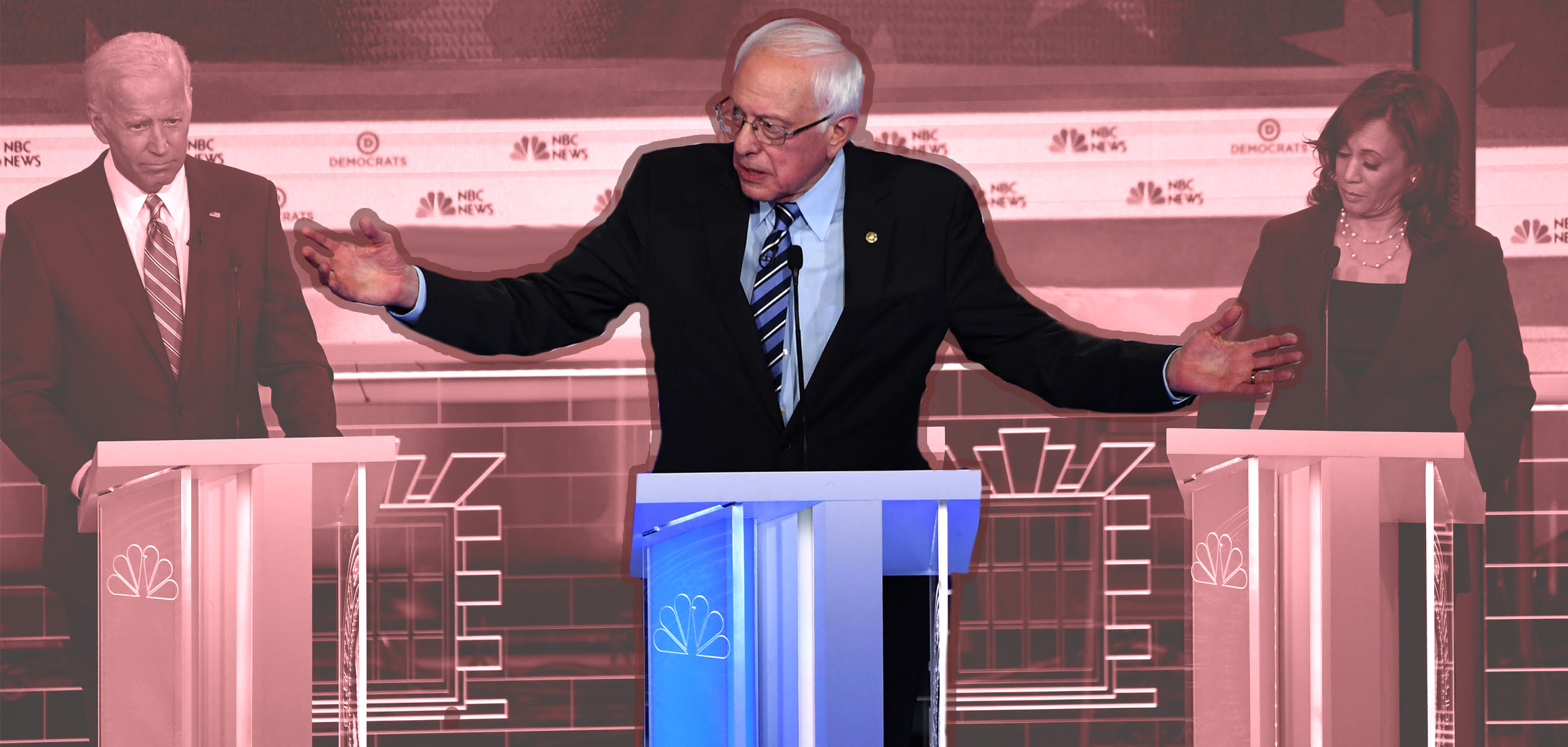The Democratic debates had a health-care problem
Neither the moderates nor the Medicare-for-all candidates argued their cases particularly well


At both the recent Democratic debates, health-care policy was discussed extensively. Unfortunately, there was very little clarity. The main reason for this was that moderate Democrats failed to accurately describe the problem with American health care, and the arguments they put forth were misleading and muddled. But the supporters of Medicare-for-all didn't do a great job outlining why their policy is the best, either.
Probably the most wildly false thing said at either of the debates came from Sen. Michael Bennet (D-Colo.), who implied that America is just too big for such a program as Medicare-for-all. When Sen. Bernie Sanders (I-Vt.) pointed out that Canada has (literally) Medicare-for-all, Bennet responded: "When Senator Sanders says that Canada is single payer, there are 35 million people in Canada. There are 330 million people in the United States."
It should be obvious to anyone who thinks about it for five seconds that in any insurance scheme, the greater the enrolled population, the stronger it will be, because size provides greater financial security in case of expensive illness. That is why employer-based coverage is generally cheaper at bigger companies. It follows that a larger country will have an easier time insuring its population than a smaller one. The fact that medium-sized or small countries like Canada or Finland can operate a national insurance program means the U.S. could do it for sure.
The Week
Escape your echo chamber. Get the facts behind the news, plus analysis from multiple perspectives.

Sign up for The Week's Free Newsletters
From our morning news briefing to a weekly Good News Newsletter, get the best of The Week delivered directly to your inbox.
From our morning news briefing to a weekly Good News Newsletter, get the best of The Week delivered directly to your inbox.
But that is just one small part of the moderate muddle on health-care policy. America's issue with Medicare-for-all is not about size, but about the hideous tangle of institutions and grasping profiteers that flushes at least $1 trillion in national income down the toilet each and every year. We pay a full 5 percentage points of GDP more than the next-most expensive country for our health care, and have middling-to-poor health outcomes to show for it.
To a first approximation, the biggest problem with American health care is the prices, which are far, far higher than those in peer nations and all vary widely between different U.S. regions. Many hospitals don't even have a clue what their procedures actually cost. Any sensible reform would therefore focus on getting prices under control — and especially on the epidemic of waste and outright fraud that is rampant within all too many medical providers.
Barely anyone mentioned this aspect of the issue at hand. Instead, the moderates mainly focused on preserving the current employer-sponsored system, so that people could have a "choice" between that and a government program, while Medicare-for-all supporters focused their ire on insurance companies. Neither argument is directly on point. Promising to preserve private coverage means abandoning an efficient, complete national system, and forecloses the choice of not wanting to choose in the first place. On the other hand, while progressives often don't want to hear it, insurance companies are not the only villains in this story. Many providers are just as bad if not worse — just look at all the provider associations who have signed up with the new lobbying group peddling lies about Medicare-for-all. That $1 trillion is a lot of salaries and profits!
Fortunately, Medicare-for-all would have one very powerful lever against the price problem: the ability to directly set prices for all medical procedures. Indeed, moderate Rep. John Delaney (D-Md.) actually mentioned this tangentially, when he asserted in the first debate that hospital administrators told him every single hospital would close if they could only make the Medicare reimbursement rate. This is almost certainly false, but it is true that many providers would be taking in a lot less money — though on the other hand, they would have drastically lower administrative overhead. Administrative overhead in Canadian hospitals only costs 12 percent of revenue (because they only have to deal with one insurer). In the U.S., it's 25 percent. Outside of providers that operate like stick-up gangsters, most should be able to manage with a streamlined billing department and some moderate pay cuts.
A free daily email with the biggest news stories of the day – and the best features from TheWeek.com
Conversely, moderate proposals that preserve private coverage would have far less leverage to cut skyrocketing prices. So, as usual, Very Serious moderates are not grappling with the real issues.
Another duplicitous moderate talking point (amplified once again by Jonathan Chait) is the idea of people losing their health insurance. As Delaney said, "we should also give [Americans] the option to buy private insurance. Why do we have to stand for taking away something from people?" In other words, people generally express satisfaction with their private health insurance, so if you take it away and replace it with Medicare, they might get mad! The problem here is that the employer-based private system is already throwing tens of millions of people off their insurance each and every year (not to mention that Medicare gets even greater satisfaction ratings than private coverage). As I have previously calculated, the private employer-based system creates roughly 180 million insurance loss events every 4 years — or 20 million more than would be caused by implementing Sanders' Medicare-for-all program as written.
In other words, even while Medicare-for-all was scooping up great swathes of the population at a stroke as it added everyone to the program over four years, it would still result in fewer instances of insurance loss than the private employer-based system would have over the same period. And then nobody would ever have to worry about losing coverage ever again.
Insofar as people losing their health insurance is a problem, it's the supporters of our janky employer-based system who must address it. Why do they defend this horrible structure that throws people off their coverage every time they switch jobs, get laid off, or their employer decides to change plans?
At any rate, it's not surprising that policy details got lost in such crowded and frantic debates. But don't lose sight of the fact that the most realistic, sensible way to fix the disaster of American health care is to pass Medicare-for-all tomorrow. Going for half measures will only make the problem harder to fix.
Ryan Cooper is a national correspondent at TheWeek.com. His work has appeared in the Washington Monthly, The New Republic, and the Washington Post.
-
 Starbucks workers are planning their ‘biggest strike’ ever
Starbucks workers are planning their ‘biggest strike’ everThe Explainer The union said 92% of its members voted to strike
-
 ‘These wouldn’t be playgrounds for billionaires’
‘These wouldn’t be playgrounds for billionaires’Instant Opinion Opinion, comment and editorials of the day
-
 The 5 best nuclear war movies of all time
The 5 best nuclear war movies of all timeThe Week Recommends ‘A House of Dynamite’ reanimates a dormant cinematic genre for our new age of atomic insecurity
-
 Has Zohran Mamdani shown the Democrats how to win again?
Has Zohran Mamdani shown the Democrats how to win again?Today’s Big Question New York City mayoral election touted as victory for left-wing populists but moderate centrist wins elsewhere present more complex path for Democratic Party
-
 Millions turn out for anti-Trump ‘No Kings’ rallies
Millions turn out for anti-Trump ‘No Kings’ ralliesSpeed Read An estimated 7 million people participated, 2 million more than at the first ‘No Kings’ protest in June
-
 Ghislaine Maxwell: angling for a Trump pardon
Ghislaine Maxwell: angling for a Trump pardonTalking Point Convicted sex trafficker's testimony could shed new light on president's links to Jeffrey Epstein
-
 The last words and final moments of 40 presidents
The last words and final moments of 40 presidentsThe Explainer Some are eloquent quotes worthy of the holders of the highest office in the nation, and others... aren't
-
 The JFK files: the truth at last?
The JFK files: the truth at last?In The Spotlight More than 64,000 previously classified documents relating the 1963 assassination of John F. Kennedy have been released by the Trump administration
-
 'Seriously, not literally': how should the world take Donald Trump?
'Seriously, not literally': how should the world take Donald Trump?Today's big question White House rhetoric and reality look likely to become increasingly blurred
-
 Will Trump's 'madman' strategy pay off?
Will Trump's 'madman' strategy pay off?Today's Big Question Incoming US president likes to seem unpredictable but, this time round, world leaders could be wise to his playbook
-
 Democrats vs. Republicans: who are US billionaires backing?
Democrats vs. Republicans: who are US billionaires backing?The Explainer Younger tech titans join 'boys' club throwing money and support' behind President Trump, while older plutocrats quietly rebuke new administration
